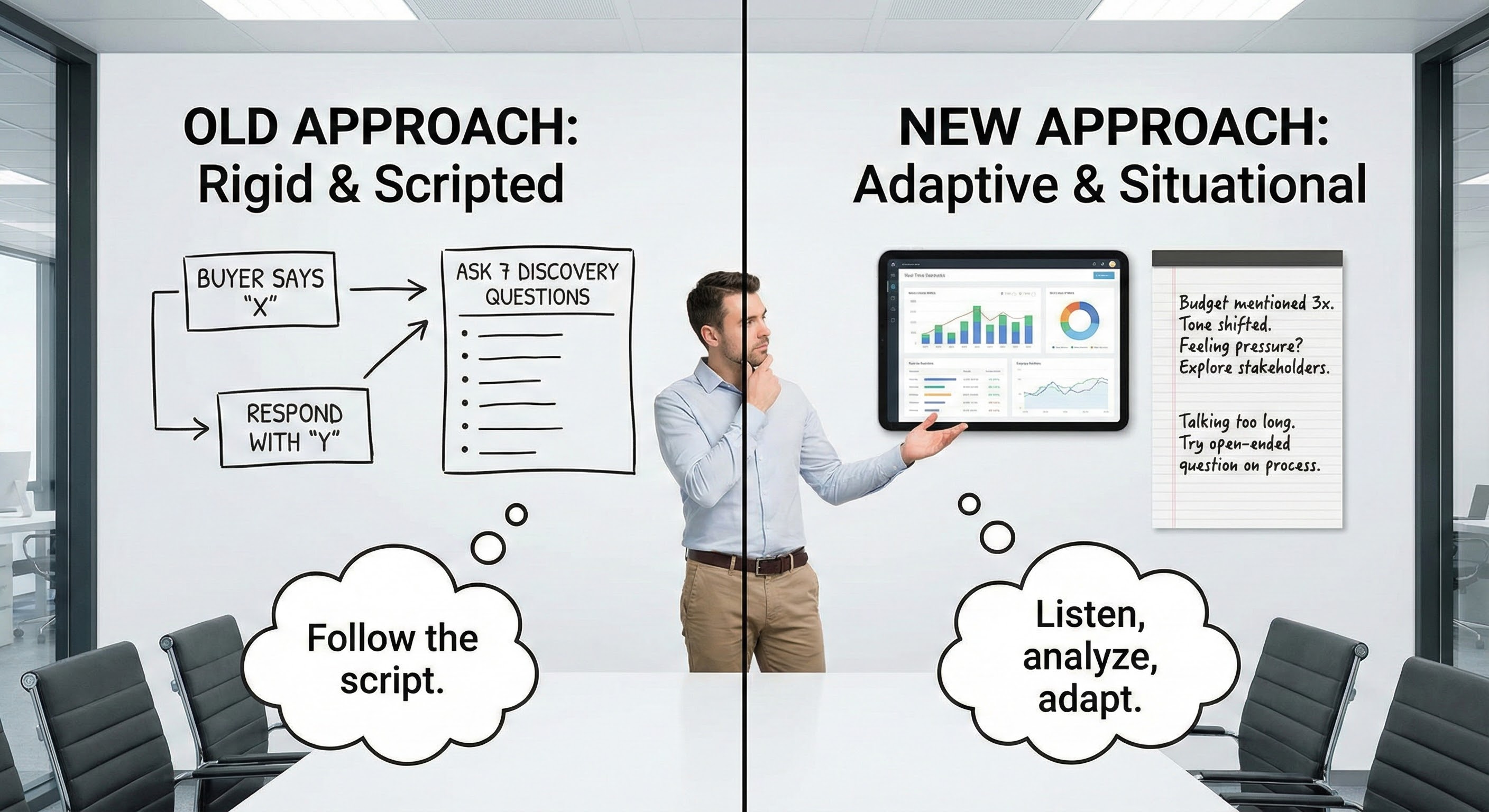AI is Revolutionizing Sales: The Latest Trends Transforming How We Sell

The sales landscape is experiencing a seismic shift as artificial intelligence moves from experimental tools to essential business infrastructure. In 2025, AI isn't just changing how sales teams operate—it's fundamentally redefining what's possible in customer engagement, lead qualification, and revenue generation. At the heart of this transformation lies a crucial element that's often overlooked: emotional intelligence.
The Current AI Sales Revolution
Sales professionals are witnessing unprecedented transformation as AI technologies mature and become more accessible. What started as basic chatbots and simple automation has evolved into sophisticated systems that can predict customer behavior, personalize interactions at scale, and even conduct preliminary sales conversations autonomously.
Predictive Sales Analytics has emerged as perhaps the most impactful trend. Modern AI systems analyze vast datasets to identify patterns invisible to human analysis, predicting which leads are most likely to convert, when existing customers might churn, and what products prospects are most likely to purchase. This isn't just about better guessing—it's about fundamentally changing how sales teams prioritize their time and energy.
Conversational AI and Virtual Sales Assistants are becoming increasingly sophisticated. These systems can handle initial prospect inquiries, qualify leads through natural conversations, and even schedule meetings—all while maintaining the personal touch that customers expect. The latest iterations can understand context, remember conversation history, and adapt their communication style to match individual prospects. However, the most successful implementations combine AI efficiency with human emotional intelligence to create authentic connections.
Emerging Trends Shaping the Future
Hyper-Personalization at Scale represents the holy grail of sales technology. AI systems now analyze individual customer journeys, purchase histories, and behavioral patterns to create uniquely tailored experiences for each prospect. This goes beyond inserting names into email templates—it's about understanding what motivates each individual buyer and crafting messaging that resonates with their specific needs and preferences. The key breakthrough is AI's growing ability to recognize emotional triggers and communication preferences, allowing sales teams to connect on a deeper, more human level.
Real-Time Sales Coaching is transforming how sales teams develop their skills. AI-powered platforms analyze sales calls in real-time, providing instant feedback on everything from talk-to-listen ratios to emotional sentiment. This immediate coaching helps representatives adjust their approach mid-conversation and continuously improve their performance. More importantly, these systems are beginning to coach emotional intelligence skills—helping salespeople recognize when a prospect is frustrated, excited, or hesitant, and suggesting appropriate responses.
Voice and Sentiment Analysis technology is giving sales teams unprecedented insight into customer emotions and intentions. By analyzing tone, pace, and word choice during calls, AI can flag when prospects are showing buying signals, expressing concerns, or losing interest—allowing sales representatives to adapt their approach accordingly. This technology essentially amplifies human emotional intelligence, helping even less naturally empathetic salespeople read emotional cues they might otherwise miss.
The Emotional Intelligence Imperative
As AI handles more routine tasks, the uniquely human skill of emotional intelligence becomes even more valuable. Empathy-Driven Sales Processes are emerging as a competitive differentiator. Sales professionals who can genuinely understand and respond to customer emotions create trust and rapport that no AI system can replicate.
Emotional Journey Mapping is becoming a critical skill. While AI can track the technical aspects of a customer's journey, emotionally intelligent salespeople understand the feelings, fears, and aspirations that drive purchasing decisions at each stage. They recognize that behind every B2B purchase is a human being worried about making the right choice, concerned about their career implications, or excited about solving a persistent problem.
Active Listening Enhanced by AI represents a powerful combination. AI tools can provide real-time transcription and sentiment analysis during calls, but emotionally intelligent salespeople use this information to practice deeper listening—not just to words, but to the emotions and motivations behind them. They pick up on hesitation, excitement, frustration, or confusion and respond appropriately.
The Integration Challenge and Opportunity
The most successful sales organizations aren't just adopting individual AI tools—they're creating integrated ecosystems where different AI technologies work together seamlessly while amplifying human emotional intelligence. Customer relationship management systems now incorporate AI-powered lead scoring, email platforms use natural language generation for personalized outreach, and video conferencing tools provide real-time conversation insights—but the magic happens when emotionally intelligent salespeople interpret and act on this information.
Emotionally Intelligent Automation is becoming more nuanced. Rather than sending generic follow-up emails, AI systems can now detect emotional states from previous interactions and suggest messaging that acknowledges the prospect's current mindset. A frustrated prospect might receive a different type of follow-up than an excited one, but it takes human emotional intelligence to ensure these communications feel authentic rather than manipulative.
Trust-Building Through Transparency is emerging as a best practice. Emotionally intelligent sales teams are learning to be transparent about their use of AI tools, building trust by explaining how technology helps them serve customers better rather than hiding it. This honesty, combined with genuine human connection, creates stronger relationships.
What's Coming Next
Looking ahead, several trends are poised to further transform the sales landscape. Predictive Content Generation will enable AI to create personalized proposals, presentations, and contracts tailored to individual prospects. However, the most effective implementations will require emotional intelligence to ensure this content resonates on a human level, not just a logical one.
Emotional AI will help sales teams better understand and respond to customer emotions throughout the buying journey. But this technology will be most powerful when combined with genuine human empathy and the ability to build authentic relationships.
Cross-Channel Intelligence is emerging as AI systems become better at tracking and analyzing customer interactions across multiple touchpoints—from social media engagement to website behavior to email responses—creating comprehensive pictures of buyer intent and readiness. Emotionally intelligent salespeople will use these insights to understand not just what customers are doing, but how they're feeling about their buying journey.
The Human-AI Partnership
The companies winning in this new landscape aren't necessarily those with the most advanced technology, but those that successfully blend AI capabilities with human emotional intelligence. The future of sales lies not in replacing human salespeople, but in augmenting their capabilities with intelligent tools that handle routine tasks and provide actionable insights, while humans focus on building relationships, understanding emotions, and creating trust.
Emotional Resilience is becoming a crucial skill as AI handles more rejection and qualification, leaving salespeople to deal with more complex, emotionally charged interactions. The ability to maintain composure, show empathy, and persist through difficult conversations becomes even more valuable when these represent a larger percentage of human-to-human sales interactions.
Authentic Relationship Building remains irreplaceable. While AI can initiate conversations and gather information, the ability to form genuine connections, understand unspoken concerns, and provide emotional support during the buying process requires human emotional intelligence.
As AI continues to evolve, sales teams that embrace these technologies while developing their emotional intelligence will find themselves with significant competitive advantages. The question isn't whether AI will transform sales—it's how quickly organizations can adapt to harness its full potential while never losing sight of the human emotions that drive every purchase decision.
The sales professionals who thrive in this new environment will be those who view AI not as a threat, but as a powerful ally that frees them to focus on what humans do best: understanding emotions, building trust, and creating meaningful relationships. In an increasingly automated world, emotional intelligence isn't just nice to have—it's the ultimate differentiator.







